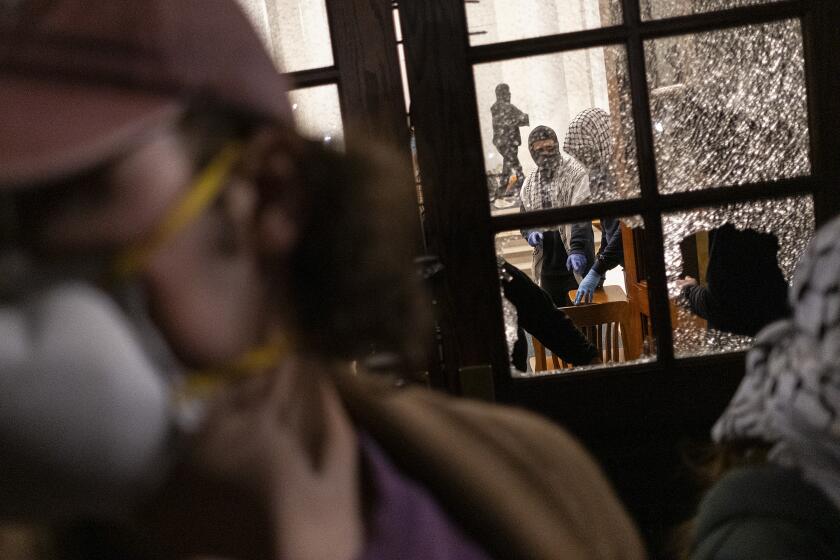Defense Dept. Policy on Investigating Gays Upheld : Court: The justices support more intense scrutiny of all homosexual applicants for ‘secret’ and ‘top secret’ clearances.
The U.S. 9th Circuit Court of Appeals on Monday upheld the Defense Department’s policy of subjecting all homosexual applicants for “secret” and “top secret” clearances to more intense investigations than other applicants.
The three-judge appeals panel overruled a 1987 decision by U.S. District Judge Thelton Henderson in San Francisco that had thrown out the regulations on the grounds that they violated the rights of gays under the equal protection clause of the Constitution.
The appeals court said homosexuals are not a protected class of individuals under the Constitution and, as a consequence, if the government could demonstrate a “rational basis” for subjecting them to greater scrutiny before a clearance was granted it would be legal.
“The decision is a disaster for gays” and will mean that they will continue to have to wait much longer for security clearances, said San Francisco civil rights lawyer Richard Gayer, who represented three individuals and an organization called High Tech Gays. He said he will seek a rehearing by a larger panel of the 9th Circuit.
Justice Department lawyer Jay S. Bybee, who argued the appeal, said he could not comment because he had not yet read the decision.
“No one has the ‘right’ to a security clearance,” stated the opinion, written by Circuit Judge Melvin Brunetti, an appointee of former President Ronald Reagan. He was joined by Circuit Judge Edward Leavy, also a Reagan appointee, and U.S. District Judge Jesse Curtis, an appointee of President John F. Kennedy, who was sitting by designation.
The Defense Department regulations in question provide that “extramarital sexual relations are considered a legitimate concern (for inquiry) when the potential for undue influence or duress exists.” Additionally, the regulations provide that “other sexual conduct, including homosexuality, bestiality, fetishism” and several other types of activity are considered “a relevant consideration in circumstances in which deviant conduct indicates a personality disorder or could result in exposing the individual to direct or indirect blackmail or coercion.”
The plaintiffs asserted that the policy violates their Constitutional rights to freedom of speech and association and to equal protection and due process of law.
In 1987, Henderson agreed, ruling that “gay people are a ‘quasi-suspect class’ ” and disparate treatment of them should be subjected to “heightened scrutiny” by a judge. He said the regulations “must withstand strict scrutiny because they impinge upon the right of lesbians and gay men to engage in any homosexual activity, not merely sodomy, and thus impinge upon their exercise of a fundamental right.”
The federal judge rejected the Defense Department’s reasons for its policies and granted a summary judgment for the plaintiffs.
The appeals court reversed Henderson on all key points and granted a summary judgment, approving the Defense Department regulations.
“The Supreme Court has ruled that homosexual activity is not a fundamental right protected by” the due process clause of the Fifth Amendment, Brunetti wrote, referring to a 1986 U.S. Supreme Court decision that upheld a Georgia law prohibiting sodomy. Therefore, he added, the Defense Department policy did not have to withstand the test of “strict scrutiny,” but merely had to be shown to have “a rational basis.”
The court also said homosexuals did not meet all the qualifications that are required of “a suspect class” under the law.
The court acknowledged that gays “have suffered a history of discrimination,” the first requirement. However, Brunetti’s opinion states that “homosexuality is not an immutable characteristic,” such as being black, or female, and that gays are not politically powerless.
The court said that the Defense Department had demonstrated that there was “a rational basis” for subjecting gay applications for security clearance to more scrutiny.
The judges referred to a declaration by John Donnelly, assistant deputy undersecretary of defense for counterintelligence and security, who is directly responsible for ensuring that the department’s personnel security program is responsive to threats posed by foreign intelligence agencies.
While Donnelly noted that hostile agencies do not “always seek out homosexuals as targets, they usually spot individuals with the desired access and then assess (them) in order to determine the most effective approach”--including looking for financial problems, alcohol or drug problems, a known disregard for security “and/or those who can be exploited sexually.”
The judges said that the Defense Department “is not required to conclusively establish that homosexuals have transmitted classified information for its policy . . . to be constitutional.”
More to Read
Start your day right
Sign up for Essential California for news, features and recommendations from the L.A. Times and beyond in your inbox six days a week.
You may occasionally receive promotional content from the Los Angeles Times.






